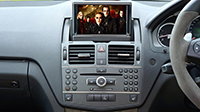 If someone steals your credit card number, you can report it missing and get a new one. If someone hacks into your email, you can change your password. What do you do if you’re riding in a self-driving car that gets hacked? We’ve all seen that part in Batman Returns where the Penguin hacks into the Batmobile and uses it to wreak havoc around town, but how realistic a threat is that in the real world?
If someone steals your credit card number, you can report it missing and get a new one. If someone hacks into your email, you can change your password. What do you do if you’re riding in a self-driving car that gets hacked? We’ve all seen that part in Batman Returns where the Penguin hacks into the Batmobile and uses it to wreak havoc around town, but how realistic a threat is that in the real world?
Well, it’s already happened. A Defense Department-backed group of researchers in Virginia managed to remotely hack into a driverless car. The photo used in the article is pretty dramatic, showing a driverless van having crashed right through an obstacle set up on the course. The purpose behind the experiment was to determine how severe a threat driverless car-hacking can be. The hack targeted the automated features of the car, including braking and acceleration. Frightening, sure, but they also discovered that it’s quite easy to combat these hacks in realtime.
Manual override is one option, but the researchers found that an automated response may be our best bet for avoiding an accident should a driverless car be targeted in a cyberattack, as a built-in security system will be able to respond to the attack more quickly than would a human driver.
An unfortunate setback in cybersecurity in driverless cars: Manufacturers are currently unable to track cyberattacks due to laws preventing certain types of data-collection. You don’t want Google keeping tabs on everywhere you go in your vehicle, so data is simply deleted after you get from point A to point B. This is an area where the law is not keeping up with the technology. For self-driving cars to be truly safe, we need legislation that allows for companies to track data that might be relevant to driverless cybersecurity without compromising passenger privacy.
The researchers noted that their goals at the moment are to reduce the cost of their realtime cyberattack-response software, and turn it into something that can be easily installed into a self-driving automobile, perhaps through a smartphone or digital download. Although, at this point, it’s difficult to make specific predictions about the driverless car market. It may well be that the team’s techniques will become a foundation on which all driverless security software is based, or the first big wave of driverless cars may be released with firmware that is effectively unhackable. In short: Yes these cars are at risk, but it’s not quite as scary as it sounds.





